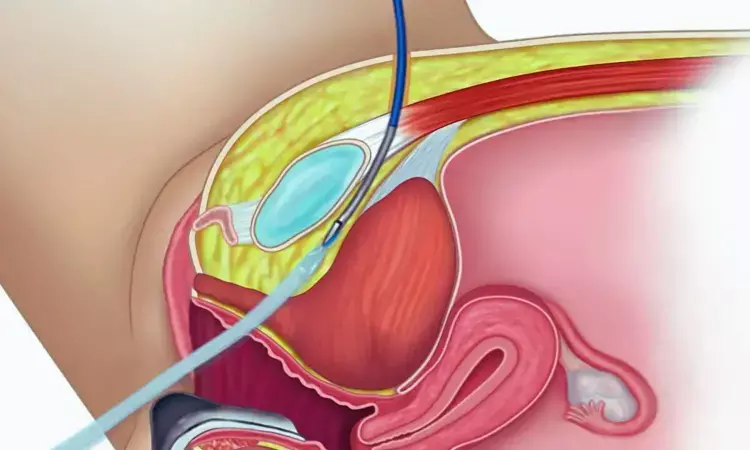- Home
- Medical news & Guidelines
- Anesthesiology
- Cardiology and CTVS
- Critical Care
- Dentistry
- Dermatology
- Diabetes and Endocrinology
- ENT
- Gastroenterology
- Medicine
- Nephrology
- Neurology
- Obstretics-Gynaecology
- Oncology
- Ophthalmology
- Orthopaedics
- Pediatrics-Neonatology
- Psychiatry
- Pulmonology
- Radiology
- Surgery
- Urology
- Laboratory Medicine
- Diet
- Nursing
- Paramedical
- Physiotherapy
- Health news
- Fact Check
- Bone Health Fact Check
- Brain Health Fact Check
- Cancer Related Fact Check
- Child Care Fact Check
- Dental and oral health fact check
- Diabetes and metabolic health fact check
- Diet and Nutrition Fact Check
- Eye and ENT Care Fact Check
- Fitness fact check
- Gut health fact check
- Heart health fact check
- Kidney health fact check
- Medical education fact check
- Men's health fact check
- Respiratory fact check
- Skin and hair care fact check
- Vaccine and Immunization fact check
- Women's health fact check
- AYUSH
- State News
- Andaman and Nicobar Islands
- Andhra Pradesh
- Arunachal Pradesh
- Assam
- Bihar
- Chandigarh
- Chattisgarh
- Dadra and Nagar Haveli
- Daman and Diu
- Delhi
- Goa
- Gujarat
- Haryana
- Himachal Pradesh
- Jammu & Kashmir
- Jharkhand
- Karnataka
- Kerala
- Ladakh
- Lakshadweep
- Madhya Pradesh
- Maharashtra
- Manipur
- Meghalaya
- Mizoram
- Nagaland
- Odisha
- Puducherry
- Punjab
- Rajasthan
- Sikkim
- Tamil Nadu
- Telangana
- Tripura
- Uttar Pradesh
- Uttrakhand
- West Bengal
- Medical Education
- Industry
Shorter Incontinence Slings Show Inferior Outcomes but Fewer Complications, Study Finds

Norway: A recent study has raised important questions about the effectiveness and safety of shorter slings used to treat urinary incontinence, a common condition affecting many individuals, particularly women. The study compared shorter sling procedures, designed to treat stress urinary incontinence (SUI), with longer sling techniques, focusing on continence outcomes and safety profiles over 6-12 months.
The findings, published in the International Urogynecology Journal revealed that shorter slings lead to worse continence outcomes, both subjectively and objectively, over 6-12 months, but are associated with fewer complications overall, except for longer-lasting postoperative pain.
Traditional slings, such as tension-free vaginal tape (TVT) and tension-free vaginal tape obturator inside-out (TVT-O), are known for their reliable continence outcomes but can lead to serious complications. To address this, Kjersti Rimstad, Faculty of Medicine, University of Oslo, Oslo, Norway, and colleagues aimed to assess whether slings with less synthetic material, namely Ajust and TVT-O Abbrevo (TVT-A), have similar failure and complication rates over 6 to 12 months, including the risk of prolonged postoperative pain, when compared to traditional slings.
For this purpose, the researchers conducted a registry study using data from the Norwegian Female Incontinence Registry (NFIR), which included 611 patients who received Ajust, 2,772 who received TVT-O Abbrevo (TVT-A), and 18,612 who had traditional slings. The study utilized preoperative, surgical, and 6–12-month follow-up data collected between 2009 and 2021.
Objective failure was defined as ≥1 g of leakage on a standardized cough-jump stress test, while subjective failure was defined as a stress index score ≥3 on a validated questionnaire. Prolonged postoperative pain was defined as pain lasting more than 3 months.
The following were the key findings of the study:
- At the 6–12 month follow-up, the groups showed significant differences.
- Objective failure rates: Ajust 15.4%, TVT-A 13.5%, traditional slings 7.3%.
- Subjective failure rates: Ajust 23.4%, TVT-A 23.8%, traditional slings 18.8%.
- Shorter slings had fewer overall complications: Ajust 4.9%, TVT-A 6.5%, traditional slings 9.3%.
- Shorter slings did not have less prolonged postoperative pain: TVT-A 1.4%, Ajust 0.8%, traditional slings 0.7%.
- All findings remained significant after adjusting for baseline differences.
The findings showed that all types of slings investigated showed good continence outcomes, both subjectively and objectively, with low failure rates after 6–12 months. While the shorter slings demonstrated slightly higher failure rates, the differences were minimal and unlikely to have a significant clinical impact.
Despite the slightly reduced effectiveness of shorter slings, they appeared to result in fewer overall complications. However, the Ajust™ sling was associated with higher rates of new-onset urgency incontinence, and the TVT-A sling had higher rates of prolonged postoperative pain. When comparing the two traditional slings, the TVT had the highest complication rate, while the TVT-O was more comparable to the shorter slings concerning complications.
"The study suggests that there is no definitive "best" sling for surgery, and the choice between a traditional or shorter sling should be based on careful discussion between the patient and doctor, considering both effectiveness and potential risks," the researchers concluded. "The findings also highlight that the incidence of prolonged postoperative pain is low across all slings, a point that should be communicated to health authorities given ongoing concerns about the future use of synthetic slings for stress urinary incontinence. Further studies are needed to better understand the long-term outcomes and rates of postoperative pain associated with different sling types."
Reference:
Rimstad, K., Oversand, S.H., Engh, M.E. et al. Effectiveness and Safety of Shorter Incontinence Slings. Int Urogynecol J (2024). https://doi.org/10.1007/s00192-024-05971-5
Dr Kamal Kant Kohli-MBBS, DTCD- a chest specialist with more than 30 years of practice and a flair for writing clinical articles, Dr Kamal Kant Kohli joined Medical Dialogues as a Chief Editor of Medical News. Besides writing articles, as an editor, he proofreads and verifies all the medical content published on Medical Dialogues including those coming from journals, studies,medical conferences,guidelines etc. Email: drkohli@medicaldialogues.in. Contact no. 011-43720751


